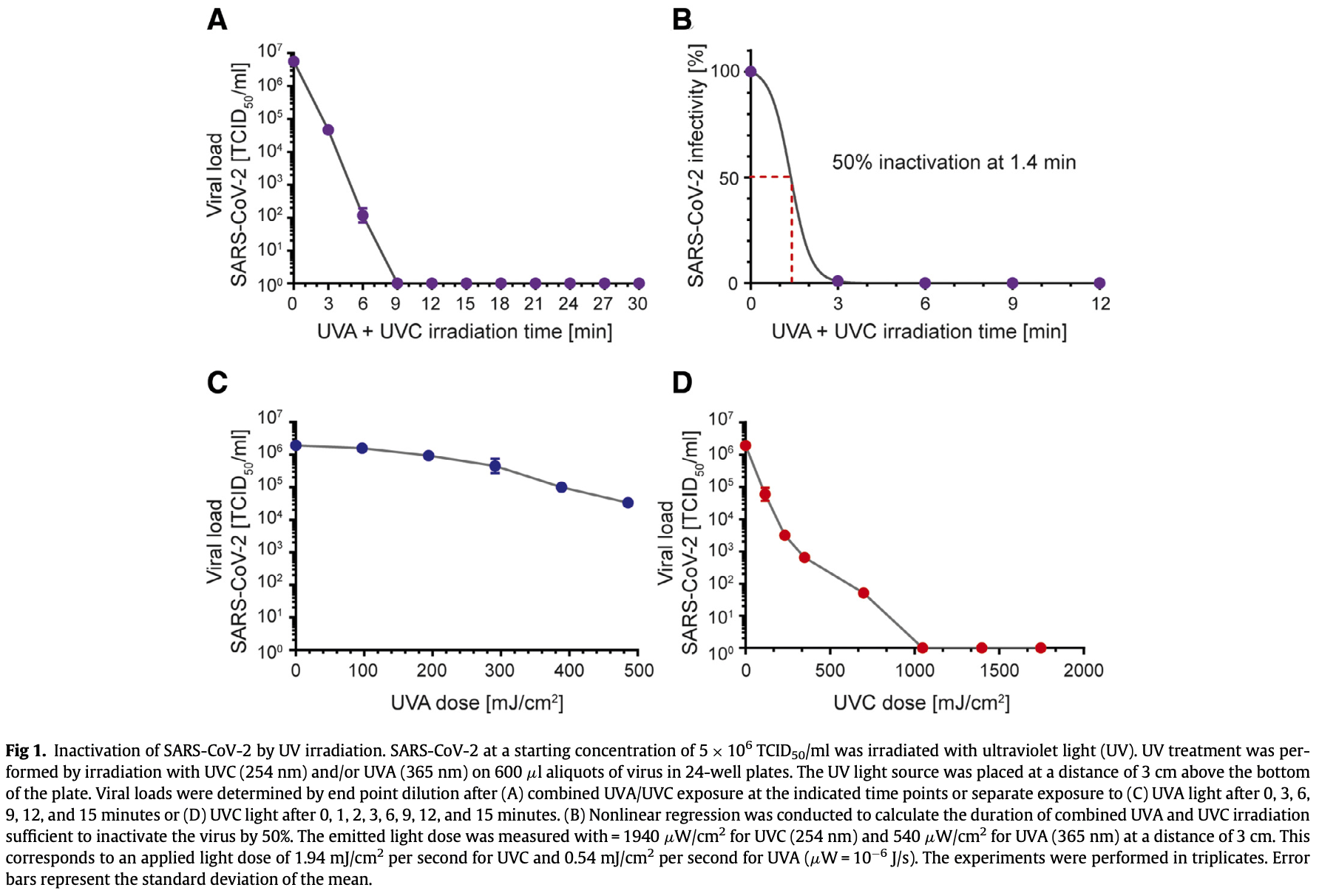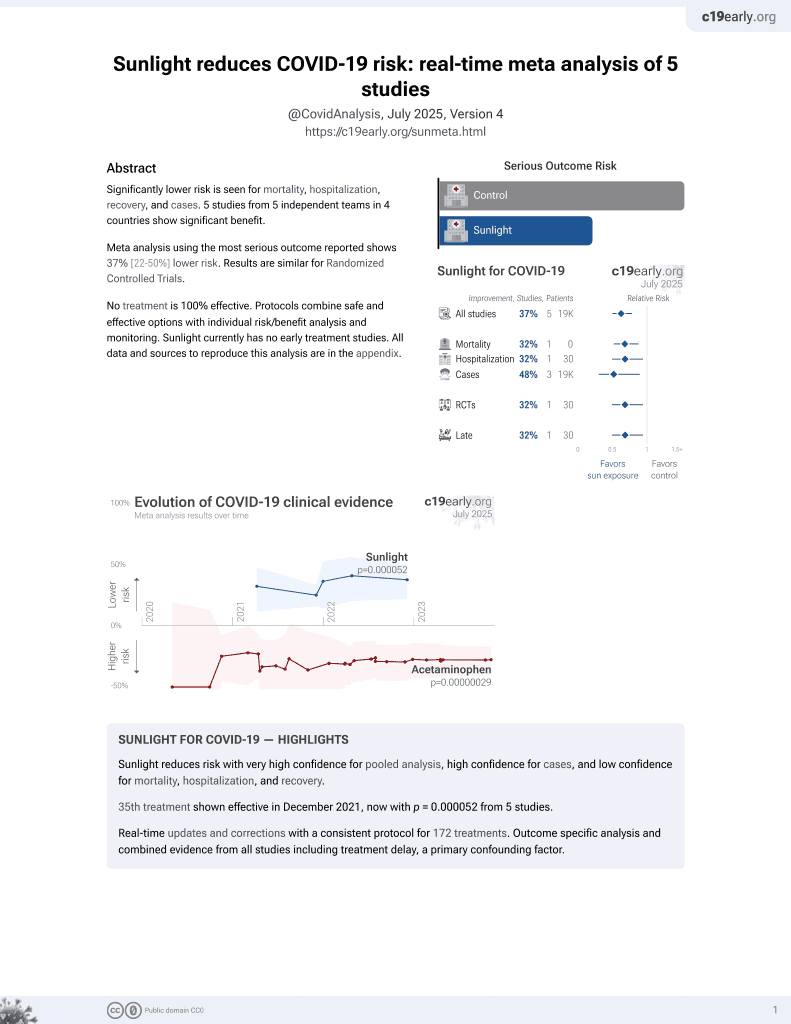
Susceptibility of SARS-CoV-2 to UV irradiation
et al., American Journal of Infection Control, doi:10.1016/j.ajic.2020.07.031, Oct 2020
Sunlight for COVID-19
36th treatment shown to reduce risk in
December 2021, now with p = 0.000052 from 5 studies.
No treatment is 100% effective. Protocols
combine treatments.
6,400+ studies for
210+ treatments. c19early.org
|
In vitro study showing high infectious titer SARS-CoV-2 completely inactivated by UVC irradiation in 9 minutes. The UVC dose required for complete inactivation was 1,048 mJ/c.
Heilingloh et al., 31 Oct 2020, Germany, peer-reviewed, 12 authors.
Contact: adalbert.krawczyk@uni-due.de.
Susceptibility of SARS-CoV-2 to UV irradiation
American Journal of Infection Control, doi:10.1016/j.ajic.2020.07.031
The coronavirus SARS-CoV-2 pandemic became a global health burden. We determined the susceptibility of SARS-CoV-2 to irradiation with ultraviolet light. The virus was highly susceptible to ultraviolet light. A viral stock with a high infectious titer of 5 £ 10 6 TCID 50 /mL was completely inactivated by UVC irradiation after nine minutes of exposure. The UVC dose required for complete inactivation was 1,048 mJ/cm 2 . UVA exposure demonstrated only a weak effect on virus inactivation over 15 minutes. Hence, inactivation of SARS-CoV-2 by UVC irradiation constitutes a reliable method for disinfection purposes in health care facilities and for preparing SARS-CoV-2 material for research purpose.
References
Anderson, Derraik, Connelly, Anderson, Rapid evidence summary on SARS-CoV-2 survivorship and disinfection, and a reusable PPE protocol using a double-hit process. medRxiv, doi:10.1101/2020.04.02.20051409v1
Casini, Tuvo, Cristina, Evaluation of an ultraviolet C (UVC) light-emitting device for disinfection of high touch surfaces in hospital critical areas, Int J Environ Res Pub Health
Darnell, Subbarao, Feinstone, Taylor, Inactivation of the coronavirus that induces severe acute respiratory syndrome, SARS-CoV, J Virol Methods
Guan, Ni, Hu, Clinical characteristics of coronavirus disease 2019 in China, N Engl J Med
Heimbuch, Research to mitigate a shortage of respiratory protection devices during public health emergencies
Li, Pei, Chen, Substantial undocumented infection facilitates the rapid dissemination of novel coronavirus (SARS-CoV-2), Science
Zhu, Zhang, Wang, A novel coronavirus from patients with pneumonia in China, N Engl J Med
DOI record:
{
"DOI": "10.1016/j.ajic.2020.07.031",
"ISSN": [
"0196-6553"
],
"URL": "http://dx.doi.org/10.1016/j.ajic.2020.07.031",
"alternative-id": [
"S0196655320307562"
],
"assertion": [
{
"label": "This article is maintained by",
"name": "publisher",
"value": "Elsevier"
},
{
"label": "Article Title",
"name": "articletitle",
"value": "Susceptibility of SARS-CoV-2 to UV irradiation"
},
{
"label": "Journal Title",
"name": "journaltitle",
"value": "American Journal of Infection Control"
},
{
"label": "CrossRef DOI link to publisher maintained version",
"name": "articlelink",
"value": "https://doi.org/10.1016/j.ajic.2020.07.031"
},
{
"label": "Content Type",
"name": "content_type",
"value": "article"
},
{
"label": "Copyright",
"name": "copyright",
"value": "© 2020 Association for Professionals in Infection Control and Epidemiology, Inc. Published by Elsevier Inc. All rights reserved."
}
],
"author": [
{
"affiliation": [],
"family": "Heilingloh",
"given": "Christiane Silke",
"sequence": "first"
},
{
"affiliation": [],
"family": "Aufderhorst",
"given": "Ulrich Wilhelm",
"sequence": "additional"
},
{
"affiliation": [],
"family": "Schipper",
"given": "Leonie",
"sequence": "additional"
},
{
"affiliation": [],
"family": "Dittmer",
"given": "Ulf",
"sequence": "additional"
},
{
"affiliation": [],
"family": "Witzke",
"given": "Oliver",
"sequence": "additional"
},
{
"affiliation": [],
"family": "Yang",
"given": "Dongliang",
"sequence": "additional"
},
{
"affiliation": [],
"family": "Zheng",
"given": "Xin",
"sequence": "additional"
},
{
"affiliation": [],
"family": "Sutter",
"given": "Kathrin",
"sequence": "additional"
},
{
"affiliation": [],
"family": "Trilling",
"given": "Mirko",
"sequence": "additional"
},
{
"affiliation": [],
"family": "Alt",
"given": "Mira",
"sequence": "additional"
},
{
"affiliation": [],
"family": "Steinmann",
"given": "Eike",
"sequence": "additional"
},
{
"affiliation": [],
"family": "Krawczyk",
"given": "Adalbert",
"sequence": "additional"
}
],
"container-title": "American Journal of Infection Control",
"container-title-short": "American Journal of Infection Control",
"content-domain": {
"crossmark-restriction": true,
"domain": [
"clinicalkey.fr",
"clinicalkey.jp",
"clinicalkey.es",
"clinicalkey.com.au",
"ajicjournal.org",
"clinicalkey.com",
"elsevier.com",
"sciencedirect.com"
]
},
"created": {
"date-parts": [
[
2020,
8,
4
]
],
"date-time": "2020-08-04T15:33:19Z",
"timestamp": 1596555199000
},
"deposited": {
"date-parts": [
[
2022,
11,
16
]
],
"date-time": "2022-11-16T21:35:32Z",
"timestamp": 1668634532000
},
"indexed": {
"date-parts": [
[
2023,
5,
20
]
],
"date-time": "2023-05-20T12:57:14Z",
"timestamp": 1684587434363
},
"is-referenced-by-count": 261,
"issue": "10",
"issued": {
"date-parts": [
[
2020,
10
]
]
},
"journal-issue": {
"issue": "10",
"published-print": {
"date-parts": [
[
2020,
10
]
]
}
},
"language": "en",
"license": [
{
"URL": "https://www.elsevier.com/tdm/userlicense/1.0/",
"content-version": "tdm",
"delay-in-days": 0,
"start": {
"date-parts": [
[
2020,
10,
1
]
],
"date-time": "2020-10-01T00:00:00Z",
"timestamp": 1601510400000
}
}
],
"link": [
{
"URL": "https://api.elsevier.com/content/article/PII:S0196655320307562?httpAccept=text/xml",
"content-type": "text/xml",
"content-version": "vor",
"intended-application": "text-mining"
},
{
"URL": "https://api.elsevier.com/content/article/PII:S0196655320307562?httpAccept=text/plain",
"content-type": "text/plain",
"content-version": "vor",
"intended-application": "text-mining"
}
],
"member": "78",
"original-title": [],
"page": "1273-1275",
"prefix": "10.1016",
"published": {
"date-parts": [
[
2020,
10
]
]
},
"published-print": {
"date-parts": [
[
2020,
10
]
]
},
"publisher": "Elsevier BV",
"reference": [
{
"DOI": "10.1056/NEJMoa2001017",
"article-title": "A novel coronavirus from patients with pneumonia in China, 2019",
"author": "Zhu",
"doi-asserted-by": "crossref",
"first-page": "727",
"journal-title": "N Engl J Med",
"key": "10.1016/j.ajic.2020.07.031_bib0001",
"volume": "382",
"year": "2020"
},
{
"DOI": "10.1126/science.abb3221",
"article-title": "Substantial undocumented infection facilitates the rapid dissemination of novel coronavirus (SARS-CoV-2)",
"author": "Li",
"doi-asserted-by": "crossref",
"first-page": "489",
"journal-title": "Science",
"key": "10.1016/j.ajic.2020.07.031_bib0002",
"volume": "368",
"year": "2020"
},
{
"DOI": "10.1056/NEJMoa2002032",
"article-title": "Clinical characteristics of coronavirus disease 2019 in China",
"author": "Guan",
"doi-asserted-by": "crossref",
"first-page": "1708",
"journal-title": "N Engl J Med",
"key": "10.1016/j.ajic.2020.07.031_bib0003",
"volume": "382",
"year": "2020"
},
{
"DOI": "10.3390/ijerph16193572",
"article-title": "Evaluation of an ultraviolet C (UVC) light-emitting device for disinfection of high touch surfaces in hospital critical areas",
"author": "Casini",
"doi-asserted-by": "crossref",
"journal-title": "Int J Environ Res Pub Health",
"key": "10.1016/j.ajic.2020.07.031_bib0004",
"volume": "16",
"year": "2019"
},
{
"DOI": "10.1016/j.jviromet.2004.06.006",
"article-title": "Inactivation of the coronavirus that induces severe acute respiratory syndrome, SARS-CoV",
"author": "Darnell",
"doi-asserted-by": "crossref",
"first-page": "85",
"journal-title": "J Virol Methods",
"key": "10.1016/j.ajic.2020.07.031_bib0005",
"volume": "121",
"year": "2004"
},
{
"article-title": "Rapid evidence summary on SARS-CoV-2 survivorship and disinfection, and a reusable PPE protocol using a double-hit process",
"author": "Anderson",
"journal-title": "medRxiv",
"key": "10.1016/j.ajic.2020.07.031_bib0006",
"year": "2020"
},
{
"author": "Brian Heimbuch",
"key": "10.1016/j.ajic.2020.07.031_bib0007",
"series-title": "Research to mitigate a shortage of respiratory protection devices during public health emergencies",
"year": "2019"
}
],
"reference-count": 7,
"references-count": 7,
"relation": {},
"resource": {
"primary": {
"URL": "https://linkinghub.elsevier.com/retrieve/pii/S0196655320307562"
}
},
"score": 1,
"short-title": [],
"source": "Crossref",
"subject": [
"Infectious Diseases",
"Public Health, Environmental and Occupational Health",
"Health Policy",
"Epidemiology"
],
"subtitle": [],
"title": "Susceptibility of SARS-CoV-2 to UV irradiation",
"type": "journal-article",
"update-policy": "http://dx.doi.org/10.1016/elsevier_cm_policy",
"volume": "48"
}
